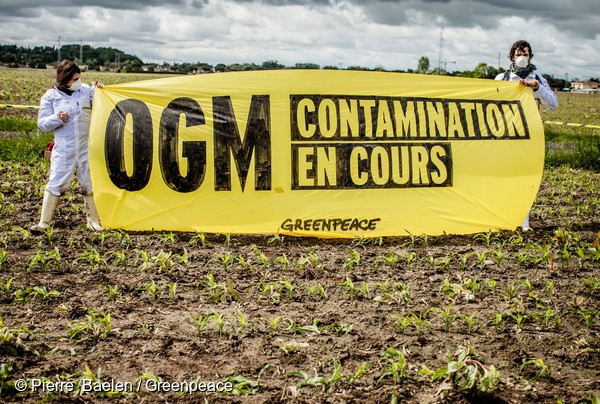Brussels – National government representatives voting today did not provide the support needed by the European Commission to approve two new genetically modified (GM) crops and extend approval of the only GM crop currently grown in the EU. The vote shows that the Commission is a long way from achieving the qualified majority [1] needed for the approval of the three pesticide-producing GM maizes [2].
Greenpeace EU food policy director Franziska Achterberg said: “Today’s vote is a clear sign that there is still no appetite for GM crops in Europe. Most countries failed to support the Commission’s proposals, despite the fact that they can now ban their cultivation nationally. Given the widespread opposition to GM crops among EU citizens and parliamentarians, the Commission would be blind to interpret this as a green light. GM crops are nothing but a prop for the harmful, intensive agriculture that is promoted by agrochemical companies. Europe should turn the page on GMOs once and for all, and focus its efforts on the urgently needed shift to ecologically sound farming.”
Background
The European Commission has proposed authorising the cultivation of DuPont Pioneer’s 1507 maize and Syngenta’s Bt11 maize, and to renew the licence for Monsanto’s maize MON810, the only GM crop currently grown in the EU.
If confirmed, the three authorisations would only be valid in 9 out of 28 EU countries, as well as in three regions (England in the UK, Flanders and the Brussels region in Belgium). The other EU countries and the remaining regions in the UK and Belgium have used the EU’s new opt-out mechanism to prevent GM crops from being grown in their territories.
The Commission has indicated that it will take the decision on the three GMOs to an appeals committee of EU country representatives this spring.
The European Parliament has repeatedly clashed with the European Commission over its policy on genetically modified organisms (GMOs). In December 2015, it called for a moratorium on all GMO import authorisations until new decision-making rules are in place. It has opposed the authorisation of several GMOs for import to the EU and rejected the proposed authorisations of GM maize 1507, GM maize Bt11 and GM maize MON810 for cultivation in the EU.
GM crops have no place in sustainable farming. They come with unacceptable risks created by the genetic engineering process and the traits they are engineered to express. At the same time, they have failed to deliver on the promises made by their producers. To protect the environment and our health, the European Union should ban GMOs and promote ecological farming methods instead of following the example of the handful of other countries where GM crops are grown.
For more information about the authorisation of the three GM maize varieties, read our media briefing.
Notes:
[1] The Commission was seeking support from a qualified majority of countries. This requires the favourable vote of at least 16 countries, representing at least 65% of the EU population.
[2] On GM maize MON810, 12 EU countries voted against approval (AT, BG, CY, DK, EL, FR, HU, IE, LU, LV, PL, SI), representing 31 per cent of the EU population; 10 EU countries voted in favour (CZ, EE, ES, FI, IT, LT, NL, RO, SE, UK), representing 47 per cent; and six abstained (BE, DE, HR, MT, PT, SK), representing 22 per cent.
On GM maize 1507 and Bt 11, 13 EU countries voted against (AT, BG, CY, DK, EL, IE, FR, HU, LU, LV, PL, SI, SE), representing 33 per cent of the EU population; eight voted in favour (EE, ES, FI, IT, LT, NL, RO, UK), representing 43 per cent; and seven abstained (BE, CZ, DE, HR, MT, PT, SK), representing 24 per cent.
Contacts:
Franziska Achterberg – Greenpeace EU food policy director, +32 (0)498 362403, [email protected]
Greenpeace EU press desk: +32 (0)2 274 1911, [email protected]
For breaking news and comment on EU affairs: www.twitter.com/GreenpeaceEU
Greenpeace is an independent global campaigning organisation that acts to change attitudes and behaviour, to protect and conserve the environment and to promote peace. Greenpeace does not accept donations from governments, the EU, businesses or political parties.

